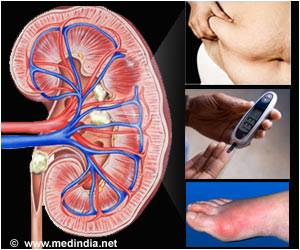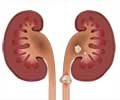Hydroxycitrate, a natural fruit extract appears to dissolve calcium oxalate crystals of the most common kidney stone.

- Kidney stones are one of the most common disorders of the urinary tract
- Most kidney stones are calcium stones in the form of calcium oxalate.
- Efficacy of hydroxycitrate (HCA) and citrate (CA) in inhibiting the growth of calcium oxalate crystals studied
- HCA has the potential to cut the incidence rate of people with chronic kidney stone disease
What are Kidney Stones?
Kidney stones are formed when the substances in the urine (calcium, oxalate and phosphorus) become highly concentrated. Common symptoms of kidney stones include severe pain in the side and the back, pain on urination and pink color urine. Hypertension, diabetes and overweight can increase the risk of kidney stones. Over the last three decades there is not much change in the preventive treatment.Types of Kidney Stones
- Calcium Stones - Most common type of kidney stone
- Uric Acid Stones are formed when the urine is acidic
- Struvite Stones usually result from kidney infections
- Cystine Stones arise from a genetic disorder that causes cystine to leak through the kidneys and into the urine
The research study grew out of preliminary work done by collaborator John Asplin, a nephrologist at Litholink Corporation, who suggested HCA could be a possible treatment for treating kidney stones.
HCA or CA for Treating Kidney Stones
- The chemical structure of HCA and CA is similar
- HCA and CA are available in the form of dietary supplement
Atomic Force Microscopy (AFM) Study Findings
How HCA and CA Bind to the Calcium Oxalate Crystals?
HCA Testing on Humans
The efficacy of HCA was also tested in human subjects. Seven people took HCA in the form of dietary supplement for three days. HCA was excreted through urine, a requirement for a dietary supplement to work as a therapy.
While Rimer said the research established the groundwork to design an effective drug, questions remain. Long-term safety, dosage and additional human trials are needed. "But our initial findings are very promising," he said. "If it works in vivo, similar to our trials in the laboratory, HCA has the potential to reduce the incidence rate of people with chronic kidney stone disease."
Jeffrey Rimer, associate professor of chemical engineering at the University of Houston is the lead author of the study published in the online edition of Nature. In addition to Rimer and Asplin, authors on the paper include Giannis Mpourmpakis and his graduate student, Michael G. Taylor, of the University of Pittsburgh; Ignacio Granja of Litholink Corporation, and Jihae Chung, a UH graduate student working in Rimer's lab.
5 Simple Ways to Prevent Kidney Stones
- Drink lots of water
- Avoid foods rich in oxalate such as okra, spinach, almonds, rhubarb
- Choose a low salt diet
- Eat more dairy foods
- Maintain a healthy weight
- Kidney Stone Prevention - (http://www.mayoclinic.org/diseases-conditions/kidney-stones/basics/prevention/con-20024829)
- Kidney Stones in Adults - (https://www.niddk.nih.gov/health-information/health-topics/urologic-disease/kidney-stones-in-adults/Pages/facts.aspx)















